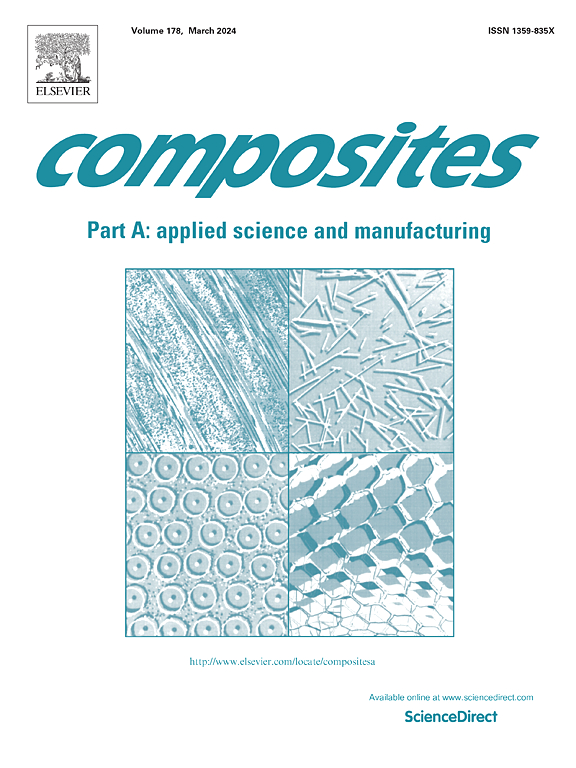Joule debonding of carbon reinforced polymer (CFRP) lap shear joints bonded with graphene nanoplatelets (GNPs)/epoxy nanocomposites
IF 8.1
2区 材料科学
Q1 ENGINEERING, MANUFACTURING
Composites Part A: Applied Science and Manufacturing
Pub Date : 2024-10-16
DOI:10.1016/j.compositesa.2024.108535
引用次数: 0
Abstract
The potential of Joule heating CFRPs joints bonded with conductive graphene/epoxy nanocomposites as adhesives for a selective debonding was investigated. To ensure a localized softening of the bondline without altering the adherend’s structure, the epoxy used in the adhesive’s formulation was chosen to have a considerably lower Tg than the adherend. Joule heating the bondline considerably reduced the lap shear strength (LSS) relative to when the test was performed at room temperature, due to thermally induced structural changes promoted in the polymer network, which was consistent with the nanocomposites’ thermomechanical behavior predicted by DMTA. The minimum LSS value was reached in the vicinity of the adhesive’s Tg, allowing an ease deconstruction of the joints. SEM characterization of their fracture surfaces revealed that by controlling the adhesive’s formulation and their Joule heating the joints’ failure mechanism can be tuned to ensure the recovery of undamaged adherends that can be reused.
用石墨烯纳米片(GNPs)/环氧纳米复合材料粘接的碳纤维增强聚合物(CFRP)搭接剪切接头的焦耳脱粘现象
研究了用导电石墨烯/环氧纳米复合材料作为粘合剂对 CFRP 接缝进行焦耳加热以实现选择性脱粘的潜力。为确保粘接线局部软化而不改变粘合剂的结构,粘合剂配方中使用的环氧树脂的 Tg 值大大低于粘合剂。与室温下进行的测试相比,焦耳加热粘合线大大降低了搭接剪切强度(LSS),这是由于聚合物网络中的热诱导结构发生了变化,这与 DMTA 预测的纳米复合材料热力学行为一致。最低 LSS 值在粘合剂的 Tg 附近达到,因此可以轻松解构接头。断裂表面的 SEM 表征显示,通过控制粘合剂的配方和焦耳加热,可以调整接头的失效机制,从而确保恢复可重复使用的未损坏粘合剂。
本文章由计算机程序翻译,如有差异,请以英文原文为准。
求助全文
约1分钟内获得全文
求助全文
来源期刊

Composites Part A: Applied Science and Manufacturing
工程技术-材料科学:复合
CiteScore
15.20
自引率
5.70%
发文量
492
审稿时长
30 days
期刊介绍:
Composites Part A: Applied Science and Manufacturing is a comprehensive journal that publishes original research papers, review articles, case studies, short communications, and letters covering various aspects of composite materials science and technology. This includes fibrous and particulate reinforcements in polymeric, metallic, and ceramic matrices, as well as 'natural' composites like wood and biological materials. The journal addresses topics such as properties, design, and manufacture of reinforcing fibers and particles, novel architectures and concepts, multifunctional composites, advancements in fabrication and processing, manufacturing science, process modeling, experimental mechanics, microstructural characterization, interfaces, prediction and measurement of mechanical, physical, and chemical behavior, and performance in service. Additionally, articles on economic and commercial aspects, design, and case studies are welcomed. All submissions undergo rigorous peer review to ensure they contribute significantly and innovatively, maintaining high standards for content and presentation. The editorial team aims to expedite the review process for prompt publication.
 求助内容:
求助内容: 应助结果提醒方式:
应助结果提醒方式:


